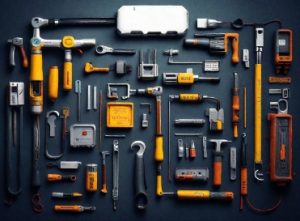Our Location
304 North Cardinal St.
Dorchester Center, MA 02124

Electricians require a wide array of specialized tools to handle a variety of electrical tasks, ranging from installing wiring systems to troubleshooting complex electrical problems. The right tools enhance productivity, ensure safety, and help deliver quality work. This report delves into the essential tools that every electrician needs, highlighting prominent brands and models that are renowned for their reliability and efficiency in the electrical industry.
A multimeter is one of the most crucial tools in an electrician’s arsenal. It measures voltage, current, and resistance and can diagnose issues like faulty wiring, dead circuits, and short circuits. Among the top brands and models are:
Voltage testers are indispensable for electricians when checking whether a circuit is live or de-energized. Unlike multimeters, these devices are more straightforward, offering a quick “yes” or “no” reading.
Electricians often need to strip the insulation from electrical wires to make clean connections. A quality wire stripper can save time and prevent damage to the wiring.
Pliers are multifunctional tools for electricians, used to bend, twist, and cut wires or small components. Different types of pliers, such as needle-nose, side-cutting, and lineman’s pliers, are essential in an electrician’s toolkit.
A set of screwdrivers and nut drivers is indispensable for any electrician. Whether mounting electrical boxes or securing terminal screws, having a variety of drivers on hand is a must.
Fish tapes are essential for pulling wire through conduits, especially when installing new circuits or electrical systems. A durable fish tape ensures efficient wiring jobs without getting stuck or damaged.
Cutting thick electrical cables requires a specialized tool. Cable cutters are designed to deliver a clean cut without damaging the internal wires or insulation.
Conduit benders are essential tools for electricians working on projects involving rigid or EMT (Electrical Metallic Tubing) conduits. Bending conduit to the desired angle is necessary for routing wiring efficiently in electrical installations.
Working in dark spaces is common for electricians, especially in unfinished buildings or when working in attics or basements. A reliable flashlight or headlamp is essential for illuminating the workspace.
Finally, every electrician needs a sturdy tool bag to organize and carry their essential tools. A well-organized tool bag improves efficiency by keeping everything within easy reach.

When working with live electrical systems, safety is paramount. Insulated tools, particularly screwdrivers, pliers, and wire cutters, are essential for protecting electricians from electrical shocks. These tools are designed with non-conductive materials that offer protection against accidental contact with live wires.
Locating the right circuit in a complex system can be a tedious and time-consuming task, especially in large buildings or industrial sites. Circuit finders are indispensable tools for electricians, as they can quickly identify which breaker controls a particular outlet or fixture.
Conduit reamers are important tools for electricians working with conduit systems. These tools are used to smooth out the inside edges of metal conduits after cutting, which is essential for preventing wire damage.
Organizing and labeling wires, breakers, and panels are crucial for both safety and ease of future maintenance. Electricians rely on label makers to create clear, durable labels for their installations.
For accurate measurements during installations, especially in large commercial or industrial projects, electricians rely on laser measuring tools. These tools help ensure that electrical components are installed at precise distances and angles.
Proper cable management is key to maintaining neat, organized electrical installations. Electricians use cable ties and other tools to bundle and secure cables, making it easier to trace circuits and maintain systems in the future.
Cordless power tools provide the mobility and convenience that electricians need when working in areas without readily available power outlets. These tools include cordless drills, saws, and impact drivers that are essential for installing, repairing, or modifying electrical systems.
Oscillating multitools are versatile devices that can cut, sand, grind, or scrape various materials. They are useful for electricians who need to make quick modifications, such as cutting access holes in walls or trimming conduit.
Electricians rely on a diverse toolkit to carry out their work effectively and safely. From diagnostic tools like multimeters and voltage testers to installation tools such as drills and conduit benders, every tool serves a specific purpose in electrical work. Leading brands like Klein Tools, Fluke, DEWALT, and Milwaukee are known for their high-quality, durable products that help electricians work with precision and efficiency.
In addition to standard hand tools, electricians also need specialized equipment like insulated tools, circuit finders, and laser measuring tools to handle the unique challenges of electrical installations. Ensuring that these tools are not only reliable but also ergonomically designed can enhance productivity and reduce fatigue during long hours on the job. By investing in the right tools, electricians can ensure they deliver safe, high-quality work across residential, commercial, and industrial projects.
